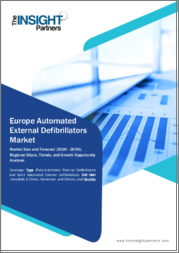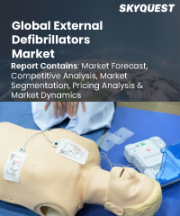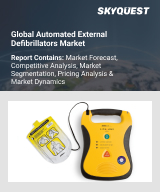
|
시장보고서
상품코드
1494562
유럽의 자동 체외식 제세동기 시장 예측(-2030년) : 지역별, 유형별, 최종 사용자별 분석Europe Automated External Defibrillators Market Forecast to 2030 - Regional Analysis - by Type (Fully-Automated External Defibrillators and Semi- Automated External Defibrillators) and End User (Hospitals & Clinics, Homecare, and Others) |
||||||
유럽의 자동 체외식 제세동기 시장은 2022년 3억 9,819만 달러에서 2030년 5억 4,501만 달러로 성장할 것으로 예상되며, 2022-2030년간 연평균 4.0%의 연평균 복합 성장률(CAGR)을 나타낼 것으로 추정됩니다.
자동심장충격기 관련 교육 및 홍보 프로그램 증가가 유럽의 자동심장충격기 시장을 주도하고 있습니다.
2019년 유럽과 미국에서 약 70만 건의 병원외 심정지(OHCA)가 발생했으며, 그 중 상당수가 가정과 공공장소에서 발생했습니다. 심폐소생술(CPR)과 자동심장충격기(AED)에 대한 인식은 유럽과 미국을 중심으로 높은 수준이며, 전 세계 성인 심정지 환자 중 심폐소생술을 받은 환자의 생존율(Global Survival Rate among Adult Out-Of-Hospital Cardiac Arrest Patients who Received 2020년에 발표된 "A Systematic Review and Meta-Analysis"는 일반인 또는 응급의료기관에서 심폐소생술을 받은 OHCA 환자의 생존율을 평가한 것으로, 특정 지역에 거주한 거주하고 있었습니다. 이 연구에 따르면, 특히 유럽과 미국에 거주하고 CPR 또는 AED를 받은 환자의 OHCA 생존율이 지난 몇 년동안 눈에 띄게 증가했다고 보고했습니다. 또한 Shocktober는 심폐소생술과 AED에 대한 인식을 높이고 지역 사회를 교육하는 세계 캠페인입니다. 이 캠페인은 2020년 10월 호주에서 시작되었습니다.
세계보건기구(WHO), 지역 보건소, 지방 정부 등 다양한 기관에서 제공하는 온라인 및 오프라인 교육 프로그램이 전 세계적으로 크게 증가하고 있습니다. 예를 들어, 영국에서는 2019년 브리티시컬럼비아 응급의료서비스(BCEHS)와 협력하여 고등학생과 중학생을 대상으로 한 교육 프로그램을 도입했습니다. 매년 4,000명 이상의 학생들이 교사를 통해 중요한 응급처치 기술을 배우게 됩니다. 구급대원 자원 봉사자들은 BCEHS에서 학생들을 교육하기 위해 교사들을 훈련시킵니다. 일부 대학에서는 BCEHS가 체육 커리큘럼의 일환으로 제세동기 교육을 실시할 예정입니다. 영국 심장 재단의 "Nation of Lifesavers-Call, Push, Rescue"는 심폐소생술과 AED에 초점을 맞춘 간단한 교육 프로그램의 한 예입니다. 영국 심장 재단은 또한 영국 내 공공 교육을 지원하기 위해 의료 전문가들의 결집을 주도하고 있으며, 2020년 덴마크의 유로 2020 개막전에서 유명 축구 선수 크리스티안 에릭센이 OHCA에 걸리면서 OHCA에 대한 인식과 제세동기를 곳곳에 설치하도록 독려하고 있습니다. 설치가 증가하였습니다. 따라서 자동심장충격기 관련 교육 및 인식 제고 프로그램 증가는 자동심장충격기 시장의 성장을 가속하고 있습니다.
유럽의 자동심장충격기 시장 개요
유럽의 자동심장충격기 시장은 독일, 영국, 프랑스, 스페인, 이탈리아, 기타 유럽으로 세분화됩니다. 이 지역 시장 성장은 만성 질환 발병률 증가, 제품 출시 증가, 제품 개발을 위한 투자 증가, 고령화 인구 급증 등의 요인에 의해 결정됩니다. 독일 연방통계청(Destatis)의 2023년 통계에 따르면, CVD는 독일 국민의 건강상태에서 중요한 역할을 하고 있으며, CVD는 독일에서 가장 흔한 사망 원인으로 2020년 전체 사망자의 34.3%를 차지합니다. 심혈관 질환의 증상은 고혈압과 부정맥입니다. 심혈관 질환의 유병률 증가는 관상 동맥 심장 질환, 심장 마비 및 뇌졸중 증가로 이어지며, 주로 노인층이 기여하고 있으며, Max Planck Institute for Biology of Ageing(Cologne)이 2019 년에 밝힌 통계에 따르면 독일에 거주하는 성인의 30 - 40%가 고혈압이었습니다. -WHO 데이터에 따르면 독일 남성 인구의 고혈압 치료율은 독일 남성 인구의 경우 약 61%였습니다. 연령이 높아질수록 이환율은 증가하며 60 세 이상에서 더 높습니다.
독일 국영 국제방송 Deutsche Welle(DW)에 따르면, 현재 65세 이상 독일인 5명 중 1명이 심혈관 질환을 앓고 있으며, 2060년에는 3명 중 1명이 심혈관 질환을 앓을 것으로 예상됩니다.
국내에서는 부정맥과 심방세동 환자의 치료 개선을 위한 다양한 연구가 진행되고 있습니다. 예를 들어, 2020년 8월 유럽심장학회는 심방세동 환자의 예후를 개선하기 위해 조기 리듬 조절 요법을 결론짓기 위한 연구 시험을 실시하였습니다. 따라서 위의 요인들은 향후 몇 년동안 독일 시장 성장에 기여할 것으로 예상됩니다.
유럽의 자동 체외식 제세동기 시장 매출 및 2030년까지 예측(금액)
유럽의 자동 체외식 제세동기 시장 세분화
유럽의 자동 체외식 제세동기 시장은 유형, 최종 사용자 및 국가별로 분류됩니다.
유형별로 유럽의 자동 체외식 제세동기 시장은 완전 자동 체외식 제세동기와 반자동 체외식 제세동기로 나뉘며, 2022년 유럽의 자동 체외식 제세동기 시장에서 완전 자동 체외식 제세동기 부문이 큰 점유율을 차지할 것으로 예상됩니다.
최종 사용자별로 유럽의 자동심장충격기 시장은 병원 및 클리닉, 재택의료, 기타로 구분됩니다. 병원 및 클리닉 부문은 2022년 유럽의 자동심장충격기 시장에서 가장 큰 점유율을 차지할 것으로 예상됩니다.
국가별로 보면 유럽의 자동 체외식 제세동기 시장은 독일, 영국, 프랑스, 스페인, 이탈리아, 기타 유럽으로 구분되며, 2022년 유럽의 자동 체외식 제세동기 시장은 독일이 독점하고 있습니다.
Asahi Kasei Corp, CU Medical Systems Inc, Koninklijke Philips NV, Mediana Co Ltd, Japan Kohden Corp, Progetti SRL, Schiller AG, Medical Electronics Co Ltd, Stryker Corp는 유럽의 자동 체외식 제세동기 시장에서 사업을 전개하고 있는 주요 기업입니다.
목차
제1장 서론
제2장 주요 요약
제3장 조사 방법
- 대상 범위
- 2차 조사
- 1차 조사
제4장 유럽의 자동 체외식 제세동기 시장 - 주요 산업 역학
- 주요 시장 성장 촉진요인
- 시장 성장 억제요인
- 시장 기회
- 향후 동향
- 영향 분석
제5장 자동 체외식 제세동기 시장 : 유럽 시장 분석
- 유럽의 자동 체외식 제세동기 시장 매출(2020-2030년)
제6장 유럽의 자동 체외식 제세동기 시장 : 유형별 매출과 2030년까지 예측
- 서론
- 유럽의 자동 체외식 제세동기 시장 : 2022년·2030년 유형별 판매량 점유율(%)
- 전자동 체외식 제세동기
- 반자동 체외식 제세동기
제7장 유럽의 자동 체외식 제세동기 시장 : 최종사용자별 매출과 2030년까지 예측
- 서론
- 유럽의 자동 체외식 제세동기 시장 : 2022년·2030년 최종사용자별 판매량 점유율(%)
- 병원 및 클리닉
- 재택치료
- 기타
제8장 유럽의 자동 체외식 제세동기 시장 : 국가별 분석
- 유럽
- 독일
- 영국
- 프랑스
- 이탈리아
- 스페인
- 기타 유럽
제9장 자동 체외식 제세동기 시장 - 업계 상황
- 서론
- 유기적 성장 전략
- 무기적 성장 전략
제10장 기업 개요
- Shenzhen Mindray Bio-Medical Electronics Co Ltd
- Stryker Corp
- Schiller AG
- Mediana Co Ltd
- Nihon Kohden Corp
- Asahi Kasei Corp
- CU Medical Systems Inc
- Progetti SRL
- Koninklijke Philips NV
제11장 부록
LSH 24.06.21The Europe automated external defibrillators market is expected to grow from US$ 398.19 million in 2022 to US$ 545.01 million by 2030. It is estimated to record a CAGR of 4.0% from 2022 to 2030.
Rising Training and Awareness Programs on Automated External Defibrillators Drive Europe Automated External Defibrillators Market
In 2019, ~700,000 cases of out-of-hospital cardiac arrest (OHCA) happened in European countries and the US, with a significant proportion of these occurring at home and in public settings. The awareness regarding cardiopulmonary resuscitation (CPR) and automated external defibrillators (AED) is high in Western countries. A study titled "The Global Survival Rate among Adult Out-Of-Hospital Cardiac Arrest Patients who Received Cardiopulmonary Resuscitation: A Systematic Review and Meta-Analysis," published in 2020, assessed the survival rates of OHCA patients who received CPR from a bystander or emergency medical services and were living in a particular region. The study reported a significant rise in the survival rates from the OHCA in the past years, especially among patients who received CPR or AED and were living in Western countries. Furthermore, Shocktober is a global campaign that raises awareness and educates the community about CPR and AEDs. This campaign was initiated in October 2020 in Australia.
Online and offline training programs by organizations such as the WHO, regional health centers, and local bodies have increased significantly across the globe. For instance, in the UK, a training program was introduced by the Advanced Coronary Treatment (ACT) Foundation for secondary school students in association with British Columbia Emergency Health Services (BCEHS) in 2019. More than 4,000 students will be empowered by their teachers with crucial lifesaving skills every year. Paramedic volunteers train teachers to educate students at BCEHS. In certain universities, BCEHS is planning to implement defibrillator training as a part of the physical education curriculum. The British Heart Foundation's "Nation of Lifesavers-Call, Push, Rescue" is another example of a simplified training program that focuses on compression-only CPR and AED. The British Heart Foundation has also taken the lead in rallying medical professionals to support public education in the UK. In 2020, during Denmark's opening Euro 2020 match, Christian Eriksen a famous footballer suffered from OHCA, which was one of the incidents that boosted awareness about OHCA and the adoption of defibrillators at various locations; the use of defibrillators helped paramedic teams save the player's life. Therefore, rising training and awareness programs on automated external defibrillators boost the automated external defibrillator market growth.
Europe Automated External Defibrillators Market Overview
The automated external defibrillator market in Europe is further segmented into Germany, the UK, France, Spain, Italy, and the Rest of Europe. The market growth in the region is determined by factors such as the rising incidences of chronic diseases, increasing number of product launches, growing investments for product developments, and a surge in the aging population. As per stats by the Federal Statistical Office (Destatis) 2023, CVD plays a significant role in the health status of the German population. CVDs are the most common cause of mortality in Germany, responsible for 34.3% of all deaths in 2020. The symptoms of cardiovascular diseases are high blood pressure and cardiac arrhythmias. The rise in the prevalence of cardiovascular diseases results in increased coronary heart disease, heart attacks, and stroke, which are majorly contributed by the elderly population. Per the statistics revealed in 2019 by the Max Planck Institute for Biology of Ageing, Cologne, ~30 to 40% of the adults living in Germany had high blood pressure. As per the data from the WHO, the treatment rate of hypertension in Germany was about 61% in the male population in Germany. The incidence rate increases with the growing age, and it is more in the people above 60.
According to the Deutsche Welle (DW), a German public state-owned international broadcaster, one in five Germans over the age of 65 suffer from cardiovascular conditions at present, which is expected to be one in three by 2060.
Various research studies are being performed in the country that aim to improve the treatment of patients suffering from arrhythmia and atrial fibrillation. For instance, in August 2020, the European Society of Cardiology conducted a research trial to conclude early rhythm control therapy to improve outcomes in patients suffering from atrial fibrillation. Thus, the above-mentioned factors are expected to contribute to the growth of the market in Germany in the coming years.
Europe Automated External Defibrillators Market Revenue and Forecast to 2030 (US$ Million)
Europe Automated External Defibrillators Market Segmentation
The Europe automated external defibrillators market is segmented into type, end user, and country.
Based on type, the Europe automated external defibrillators market is bifurcated into fully-automated external defibrillators and semi- automated external defibrillators. The fully-automated external defibrillators segment held a larger share of the Europe automated external defibrillators market in 2022.
Based on end user, the Europe automated external defibrillators market is segmented into hospitals & clinics, homecare, and others. The hospitals & clinics segment held the largest share of the Europe automated external defibrillators market in 2022.
Based on country, the Europe automated external defibrillators market is segmented into Germany, the UK, France, Spain, Italy, and the Rest of Europe. Germany dominated the Europe automated external defibrillators market in 2022.
Asahi Kasei Corp, CU Medical Systems Inc, Koninklijke Philips NV, Mediana Co Ltd, Nihon Kohden Corp, Progetti SRL, Schiller AG, Shenzhen Mindray Bio-Medical Electronics Co Ltd, and Stryker Corp are some of the leading companies operating in the Europe automated external defibrillators market.
Table Of Contents
1. Introduction
- 1.1 The Insight Partners Research Report Guidance
- 1.2 Market Segmentation
2. Executive Summary
3. Research Methodology
- 3.1 Coverage
- 3.2 Secondary Research
- 3.3 Primary Research
4. Europe Automated External Defibrillators Market - Key Industry Dynamics
- 4.1 Key Market Drivers:
- 4.1.1 Increasing Prevalence of Cardiovascular Diseases
- 4.1.2 Rising Training and Awareness Programs on Automated External Defibrillators
- 4.2 Market Restraints
- 4.2.1 Performance Issues Related to Automated External Defibrillators
- 4.3 Market Opportunities
- 4.3.1 Strategies by Key Market Players to Expand Presence in Emerging Markets
- 4.4 Future Trends
- 4.4.1 Technological Advancements
- 4.5 Impact Analysis:
5. Automated External Defibrillators Market - Europe Market Analysis
- 5.1 Europe Automated External Defibrillators Market Revenue (US$ Mn), 2020 - 2030
6. Europe Automated External Defibrillators Market - Revenue and Forecast to 2030 - by Type
- 6.1 Overview
- 6.2 Europe Automated External Defibrillators Market Revenue Share, by Type 2022 & 2030 (%)
- 6.3 Fully-Automated External Defibrillators
- 6.3.1 Overview
- 6.3.2 Fully-Automated External Defibrillators: Europe Automated External Defibrillators Market - Revenue and Forecast to 2030 (US$ Million)
- 6.4 Semi-Automated External Defibrillators
- 6.4.1 Overview
- 6.4.2 Semi-Automated External Defibrillators: Europe Automated External Defibrillators Market - Revenue and Forecast to 2030 (US$ Million)
7. Europe Automated External Defibrillators Market - Revenue and Forecast to 2030 - by End User
- 7.1 Overview
- 7.2 Europe Automated External Defibrillators Market Revenue Share, by End User 2022 & 2030 (%)
- 7.3 Hospitals and Clinics
- 7.3.1 Overview
- 7.3.2 Hospitals and Clinics: Europe Automated External Defibrillators Market - Revenue and Forecast to 2030 (US$ Million)
- 7.4 Home Care Settings
- 7.4.1 Overview
- 7.4.2 Home Care Settings: Europe Automated External Defibrillators Market - Revenue and Forecast to 2030 (US$ Million)
- 7.5 Others
- 7.5.1 Overview
- 7.5.2 Others: Europe Automated External Defibrillators Market - Revenue and Forecast to 2030 (US$ Million)
8. Europe Automated External Defibrillators Market - Country Analysis
- 8.1 Europe
- 8.1.1 Europe: Automated External Defibrillator Market, by Country
- 8.1.1.1 Germany
- 8.1.1.1.1 Overview
- 8.1.1.1.2 Germany: Automated External Defibrillator Market Revenue and Forecast to 2030 (GERMANY$ Mn)
- 8.1.1.1.3 Germany: Automated External Defibrillator Market, by Type
- 8.1.1.1.4 Germany: Automated External Defibrillator Market, by End User
- 8.1.1.2 UK
- 8.1.1.2.1 Overview
- 8.1.1.2.2 UK: Automated External Defibrillator Market Revenue and Forecast to 2030 (US$ Mn)
- 8.1.1.2.3 UK: Automated External Defibrillator Market, by Type
- 8.1.1.2.4 UK: Automated External Defibrillator Market, by End User
- 8.1.1.3 France
- 8.1.1.3.1 Overview
- 8.1.1.3.2 France: Automated External Defibrillator Market Revenue and Forecast to 2030 (US$ Mn)
- 8.1.1.3.3 France: Automated External Defibrillator Market, by Type
- 8.1.1.3.4 France: Automated External Defibrillator Market, by End User
- 8.1.1.4 Italy
- 8.1.1.4.1 Overview
- 8.1.1.4.2 Italy: Automated External Defibrillator Market Revenue and Forecast to 2030 (ITALY$ Mn)
- 8.1.1.4.3 Italy: Automated External Defibrillator Market, by Type
- 8.1.1.4.4 Italy: Automated External Defibrillator Market, by End User
- 8.1.1.5 Spain
- 8.1.1.5.1 Overview
- 8.1.1.5.2 Spain: Automated External Defibrillator Market Revenue and Forecast to 2030 (US$ Mn)
- 8.1.1.5.3 Spain: Automated External Defibrillator Market, by Type
- 8.1.1.5.4 Spain: Automated External Defibrillator Market, by End User
- 8.1.1.6 Rest of Europe
- 8.1.1.6.1 Overview
- 8.1.1.6.2 Rest of Europe: Automated External Defibrillator Market Revenue and Forecast to 2030 (US$ Mn)
- 8.1.1.6.3 Rest of Europe: Automated External Defibrillator Market, by Type
- 8.1.1.6.4 Rest of Europe: Automated External Defibrillator Market, by End User
- 8.1.1.1 Germany
- 8.1.1 Europe: Automated External Defibrillator Market, by Country
9. Automated External Defibrillators Market-Industry Landscape
- 9.1 Overview
- 9.2 Organic Growth Strategies
- 9.2.1 Overview
- 9.3 Inorganic Growth Strategies
- 9.3.1 Overview
10. Company Profiles
- 10.1 Shenzhen Mindray Bio-Medical Electronics Co Ltd
- 10.1.1 Key Facts
- 10.1.2 Business Description
- 10.1.3 Products and Services
- 10.1.4 Financial Overview
- 10.1.5 SWOT Analysis
- 10.1.6 Key Developments
- 10.2 Stryker Corp
- 10.2.1 Key Facts
- 10.2.2 Business Description
- 10.2.3 Products and Services
- 10.2.4 Financial Overview
- 10.2.5 SWOT Analysis
- 10.2.6 Key Developments
- 10.3 Schiller AG
- 10.3.1 Key Facts
- 10.3.2 Business Description
- 10.3.3 Products and Services
- 10.3.4 Financial Overview
- 10.3.5 SWOT Analysis
- 10.3.6 Key Developments
- 10.4 Mediana Co Ltd
- 10.4.1 Key Facts
- 10.4.2 Business Description
- 10.4.3 Products and Services
- 10.4.4 Financial Overview
- 10.4.5 SWOT Analysis
- 10.4.6 Key Developments
- 10.5 Nihon Kohden Corp
- 10.5.1 Key Facts
- 10.5.2 Business Description
- 10.5.3 Products and Services
- 10.5.4 Financial Overview
- 10.5.5 SWOT Analysis
- 10.5.6 Key Developments
- 10.6 Asahi Kasei Corp
- 10.6.1 Key Facts
- 10.6.2 Business Description
- 10.6.3 Products and Services
- 10.6.4 Financial Overview
- 10.6.5 SWOT Analysis
- 10.6.6 Key Developments
- 10.7 CU Medical Systems Inc
- 10.7.1 Key Facts
- 10.7.2 Business Description
- 10.7.3 Products and Services
- 10.7.4 Financial Overview
- 10.7.5 SWOT Analysis
- 10.7.6 Key Developments
- 10.8 Progetti SRL
- 10.8.1 Key Facts
- 10.8.2 Business Description
- 10.8.3 Products and Services
- 10.8.4 Financial Overview
- 10.8.5 SWOT Analysis
- 10.8.6 Key Developments
- 10.9 Koninklijke Philips NV
- 10.9.1 Key Facts
- 10.9.2 Business Description
- 10.9.3 Products and Services
- 10.9.4 Financial Overview
- 10.9.5 SWOT Analysis
- 10.9.6 Key Developments
11. Appendix
- 11.1 About Us
- 11.2 Glossary of Terms



















